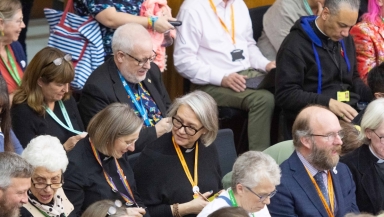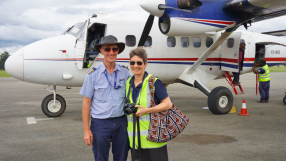
The Church of England is making its controversial prayers for the blessing of same-sex couples available for use in services from Sunday.
Use of the Prayers of Love and Faith for the first time follows their approval by the House of Bishops at an online meeting today.
The Church of England's parliamentary body, General Synod, passed a motion last month encouraging bishops to commend the prayers and permit standalone services on a trial basis.
The House of Bishops is still considering proposals for how the standalone services should be formally authorised under canon law.
The final text of the prayers, which are strongly opposed by evangelicals, were published by the Church of England today.
"The Prayers of Love and Faith are offered as resources in praying with and for a same-sex couple who love one another and who wish to give thanks for and mark that love in faith before God," the introduction reads.
"To celebrate in God's presence the commitment two people have made to each other is an occasion for rejoicing. The texts are offered to express thanksgiving and hope, with prayer that those who are dedicating their life together to God may grow in faith, love and service as God's blessing rests upon them."
The prayers ask that God would fill same-sex couples "with the grace to rejoice always in their love for one another, and to follow the Way of holiness and hope revealed in your Son Jesus Christ".
The prayers were published today along with pastoral guidance that sets out how they are to be used.
The Bishop of Newcastle, Helen-Ann Hartley, who is co-chairing the group overseeing the introduction of the prayers together with the Bishop of Leicester, Martyn Snow, said: "The Prayers of Love and Faith are resources to pray with and for a same-sex couple who are committed to one another in faithfulness and love. They are intended to enable those who wish to give thanks for and joyfully mark that commitment before God and their community of faith."
The approval of the prayers has left many evangelicals questioning their future in the Church of England. Some have already left.
Eleven bishops have publicly dissented from the decision of the House of Bishops to commend the prayers. They include the Bishop of Blackburn Philip North, the Bishop of Chichester, Martin Warner, and the Bishop of Lancaster, Jill Duff.
The House of Bishops has said it will consider pastoral provision for those who are unwilling to offer the blessings on grounds of conscience.
"It is intended that there will be wide process of consultation regarding the provision to ensure that whatever is agreed serves to promote unity and has broad support across the Church," the Church of England said.
Bishop Snow said: "We know not everyone in the Church of England agrees on these important questions which go the heart of who we are – about people's lives, their love and our shared faith. This is reflected in the House of Bishops, where there remain different views on the best ways to proceed.
"These prayers are offered as pastoral provision. It is our prayer that they can be used with grace and understanding. Sharing them will be a blessing to the whole Church."
Evangelicals have questioned how introducing the prayers can take place without undermining the Church's insistence that its doctrine on marriage as a lifelong union between a man and a woman remains unchanged.
Church of England Evangelical Council member, Andrew Goddard, has said that a "significant proportion" of the Church of England do not want the Prayers of Love and Faith and that the result of the strength of opposition could be "not another revision but the recall of the product".
Beyond England, the Global South Fellowship of Anglicans (GSFA) warned before the prayers were formally approved that they would cause the Church of England to be in violation of the "clear and canonical teaching of the Bible" and lead to "impaired communion with many provinces of the Anglican Communion".













